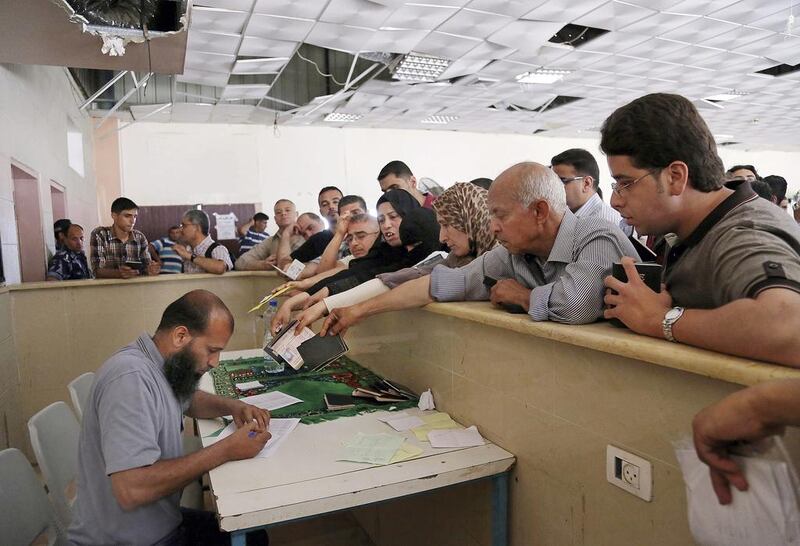RAFAH // Egypt opened its borders with the Gaza Strip for the first time in three months on Saturday, in a possible sign of easing tensions between Cairo and Hamas.
The Rafah border crossing will operate for six hours a day for the coming three days and 15,000 Palestinians have applied to exit to Egypt, said Maher Abu Sabha, head of the Gaza side of the crossing. He said those were humanitarian cases and included medical patients, students and Palestinians whose residency permits in other countries were about to expire. However, only 1,500 of these people were actually expected to pass through, he said.
Local residents said an initial bus with passengers had crossed into Egypt and a source at Cairo international airport said Palestinians were flying in to set out overland for Gaza.
Meanwhile, a Palestinian official said seven lorries with building materials for the private sector entered Gaza on Saturday, the first time since 2007 that Egypt has allowed a commercial shipment via Rafah, which is mainly used for passengers and humanitarian aid.
Gaza is under blockade by Israel and Rafah is the territory’s only gateway to the outside world that is not under Israeli control. But Egypt has kept the crossing mostly closed since Hamas seized control of the coastal strip in 2007. Saturday’s opening of the crossing is seen as a humanitarian gesture by Egypt ahead of Ramadan.
Outside the crossing on Saturday, hundreds of Palestinians struggled for a place on one of the buses that would travel to Egypt. One hopeful traveller, Khaled Abu Okal, 27, is a doctoral student at a university in Malaysia who came to visit his family after last summer’s war and has been unable to leave since.
“If I cannot make it through this time, I will lose just another (academic) year,” Mr Okal said. “I already lost one.”
Outside the passport hall at Rafah, a woman and her children sat in the dirt with tears in their eyes. Youssra Abu Qouta said she wants to take her two daughters, aged 9 and 11, for treatment in an Egyptian hospital.
“I come here every time the crossing opens, but no luck,” she said. “We are thrown here like dogs.”
Egypt has only opened the Rafah crossing in both directions for five days this year. Last month it opened the crossing for three days, but only in one direction – for Palestinians stranded outside Gaza to return home.
The closure worsened after Egypt’s military ousted president Mohammed Morsi, a member of the Muslim Brotherhood, in 2013.
Cairo has accused Hamas – which is close to the Muslim Brotherhood – of helping militants in Egypt’s Sinai desert, which borders Gaza, to attack its security forces – a charge Hamas denies.
But a decision by an Egyptian court earlier this month to cancel a previous ruling that labelled Hamas a terrorist group was praised by the movement and raised speculation that relations between Cairo and Gaza might improve.
“The opening ... for three days is a positive indicator, it comes after another good decision taken by the court. We hope Egypt opens the crossing permanently and can regain its role in Gaza and Palestine,” said Hamas spokesman Fawzi Barhoum.
Back at the Rafah passport hall, Ahmed Abu Taeima, a Palestinian accountant who lives in Saudi Arabia, said he had waited for four months to be able to return from Gaza to the kingdom and was lucky he could get back before his Saudi residency permit expires in two weeks’ time.
“I was fearing I could lose my residency and my work,” the 34-year-old said. “Thank God the crossing has opened and I can leave.”
* Reuters and Associated Press





